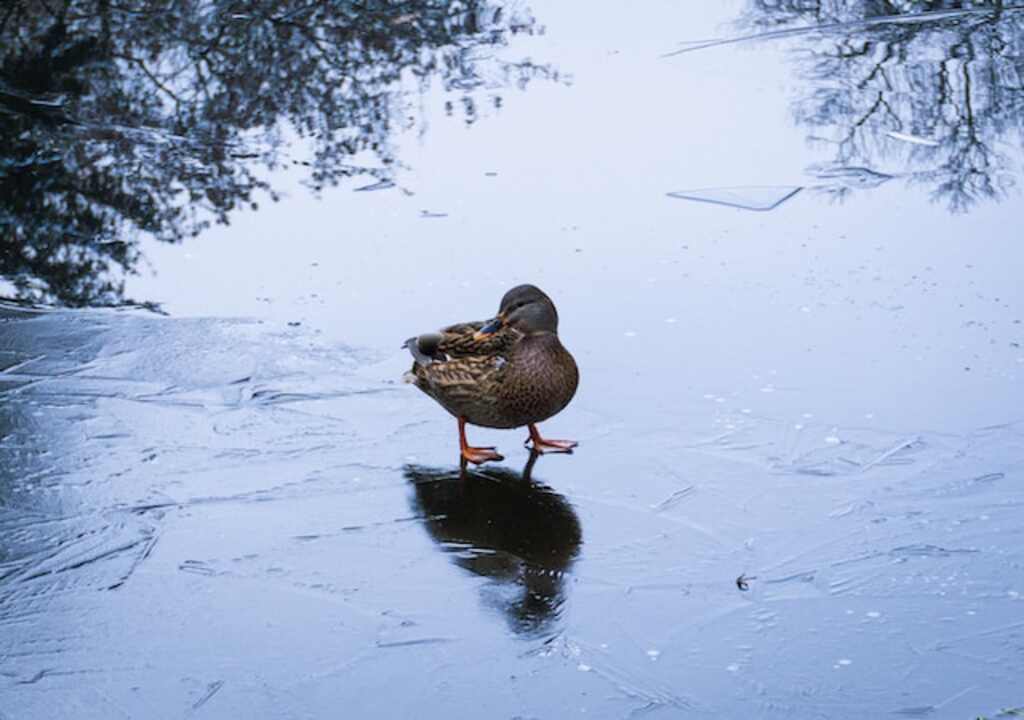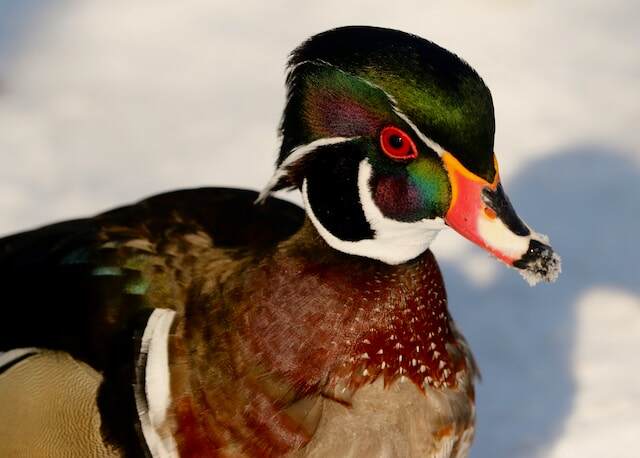Ducks are fascinating creatures that can be found all over the world, from backyard ponds to sprawling wetlands.
With their webbed feet and waterproof feathers, they are perfectly adapted to life in and around water. But what happens when the temperature drops? Do ducks get cold like we do?
In this article, we will explore how ducks adapt to cold weather and what factors can affect their ability to withstand it.
Table of Contents
- 1 Brief Overview of Ducks and Their Habitat
- 2 Do Ducks Get Cold?
- 3 Adaptations of Ducks to Cold Weather
- 4 Behavioral Adaptations of Ducks in Cold Weather
- 5 Factors That Affect Duck’s Ability to Withstand Cold Weather
- 6 Small Details About Ducks in Winter
- 7 Conclusion
- 8 FAQs: Do Ducks Get Cold?
- 8.1 Do ducks get cold in the winter?
- 8.2 How do ducks keep warm in the winter?
- 8.3 Can ducks survive in the cold?
- 8.4 What temperature is too cold for ducks?
- 8.5 Do ducks need heat lamps in the winter?
- 8.6 Can ducks get frostbite?
- 8.7 What should I do if my ducks get too cold?
- 8.8 Do ducks huddle together to keep warm?
- 8.9 Can ducks swim in cold water?
- 8.10 Do different breeds of ducks have different cold tolerances?
- 9 Author
Brief Overview of Ducks and Their Habitat
Ducks are part of the Anatidae family, which also includes geese and swans. There are over 120 species of ducks, each with its unique characteristics and adaptations that allow them to thrive in different environments.
Some species prefer freshwater habitats such as ponds, rivers, or lakes, while others are saltwater birds found along coastal areas.
In addition to their webbed feet that allow them to swim efficiently, ducks have a special gland near their tail called the preen gland, which produces oil that they spread over their feathers with their beaks.
This oil helps keep the feathers waterproof, so they can stay dry while swimming or diving.
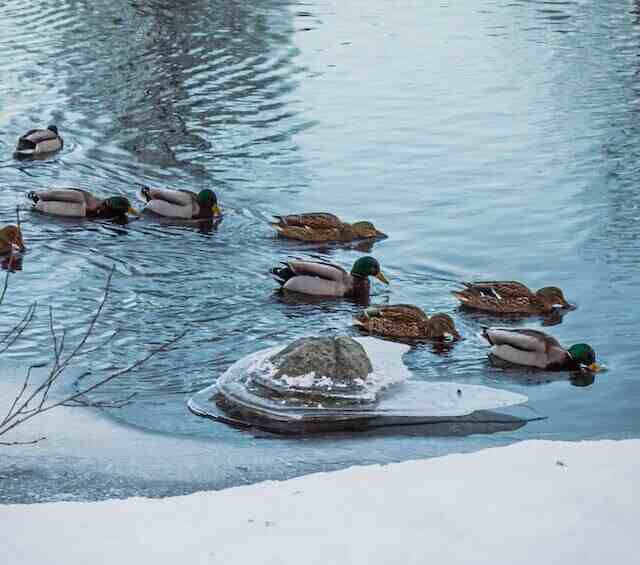
Do Ducks Get Cold?
The short answer is yes; ducks do get cold, just like any other animal. However, they have several adaptations that help them survive in cold weather conditions. Their insulation is one of the most significant adaptations.
Ducks have two types of feathers: contour feathers and down feathers. Contour feathers give ducks their distinctive appearance, while down feathers lie beneath them, providing warmth by trapping air close to the body.
In addition to insulation provided by down feathers, ducks also have a thick layer of body fat, which acts as an energy reserve during times when food may be scarce or unavailable due to harsh weather conditions.
Overall, although ducks can experience bouts of being cold, they have many adaptations to help them survive in cold weather conditions.
Adaptations of Ducks to Cold Weather
When it comes to thriving in cold weather, ducks are experts at adaptation. Their feathers and down provide excellent insulation, trapping warm air close to their bodies.
Additionally, their thick layer of body fat (also known as blubber) acts as a natural insulator, preventing heat loss through the skin.
However, this adaptation can be a double-edged sword. While the extra fat helps keep ducks warm during frigid temperatures, it also makes them less buoyant in water and slows down their movements.
Ducks also have the ability to regulate their body temperature, a characteristic that sets them apart from other birds.
They can maintain an internal temperature of approximately 104 degrees Fahrenheit regardless of external conditions.
This means that they can withstand extreme cold without experiencing hypothermia or other related ailments.
However, while ducks have many physical adaptations that help them survive cold weather conditions, they also use behavioral strategies.
Behavioral Adaptations of Ducks in Cold Weather
One such strategy is huddling together for warmth. By gathering in a tight-knit group with other ducks around them, they create what’s known as an “insulation zone.”
This zone is created by all the individual birds sharing each other’s body heat and forming a barrier against wind and cold air.
Another strategy is seeking shelter in protected areas such as marshes or reeds, where they are less exposed to harsh winds and weather elements.
Ducks will also reduce their activity levels during periods of extreme cold to conserve energy, since metabolic rates are higher when temperatures drop.
Factors That Affect Duck’s Ability to Withstand Cold Weather
While ducks have many physical and behavioral adaptations that allow them to survive freezing temperatures, several factors can impact their ability to survive winter successfully.
One such factor is age; younger or weaker ducks may be more susceptible to the effects of extreme cold weather.
The availability of food and water is also vital, since ducks require a high-calorie diet to maintain their energy during winter.
The severity and duration of cold weather can have a significant impact on duck populations.
If temperatures drop drastically and remain low for extended periods, it could cause fatalities due to hypothermia, frostbite or starvation.
Ducks can withstand cold weather with some degree of adaptability and resilience.
They have physical adaptations such as insulating feathers, thick body fat, and the ability to regulate their body temperature, as well as behavioral strategies like huddling together for warmth and reducing activity levels during extreme conditions.
While several factors can impact their ability to survive freezing temperatures successfully, with proper food supply and shelter availability, ducks can continue thriving in subzero conditions.
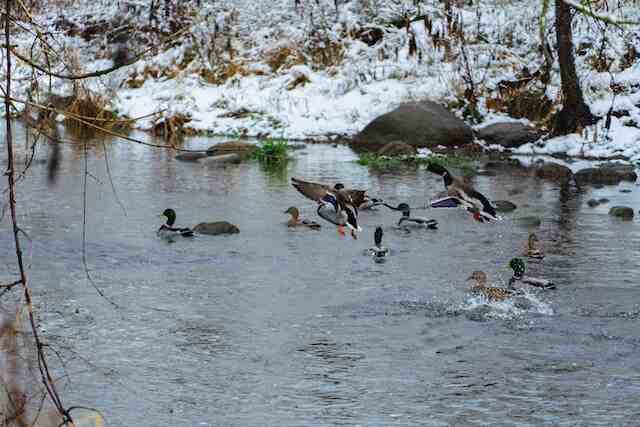
Small Details About Ducks in Winter
The Role of Preen Oil in Keeping Feathers Waterproof and Insulating
Have you ever seen ducks dabbling and preening their feathers? They are not just cleaning themselves, but also applying a special oil called preen oil.
This oil is produced by a gland near the base of their tail, and it serves a vital role in keeping their feathers waterproof and insulating. When ducks apply preen oil to their feathers, it helps to keep them clean and free of parasites.
Additionally, the oil repels water, so that when the duck dives into the water or during rain, the water rolls off their feathers instead of soaking through. Wet feathers can be deadly for ducks because they lose insulating properties when wet.
The insulation properties of down feathers combined with the waterproofing effect of preen oil keeps ducks warm and dry even in cold waters.
Therefore, it is important for wintering ducks to maintain healthy preen gland function by having access to enough food sources.
How Ducks’ Feet Adapt to Icy Water Temperatures through Counter-Current Heat Exchange Mechanism
Have you ever wondered how ducks’ feet don’t freeze in icy waters? You’ll be fascinated to learn that they have an extraordinary adaptation mechanism known as “Counter-current heat exchange.”
The counter-current heat exchange system prevents body heat from being lost through the feet by enabling warm arterial blood flowing down into an extremity (such as webbed feet) to transfer its heat energy into cooler venous blood flowing back towards the body core from that same extremity.
In this way, warmth is retained in key parts of a duck’s body.
This adaptation allows ducks’ feet to withstand freezing temperatures without damage, while maintaining circulation throughout their bodies.
As such, you’ll often see them standing on one leg with the other tucked up into their plumage, minimizing the contact with cold water.
The Importance of Maintaining Open Water Sources for Wintering Ducks
During winter months, ducks need access to open water sources to survive. This is because they require water for bathing and preening, as well as for finding food. However, during colder months these water sources can freeze over, limiting the available open areas.
It’s important for humans to ensure that these vital open water sources remain available by using heaters or other means to keep the water from freezing over completely.
This helps maintain suitable habitats for wintering ducks and ensures their survival through the harsh winter months.
Providing open waters also benefits other aquatic species that rely on these same resources during winter, when ice coverage increases.
As a result, we humans play a crucial role in preserving local ecosystems by ensuring that adequate open waters exist during winter.
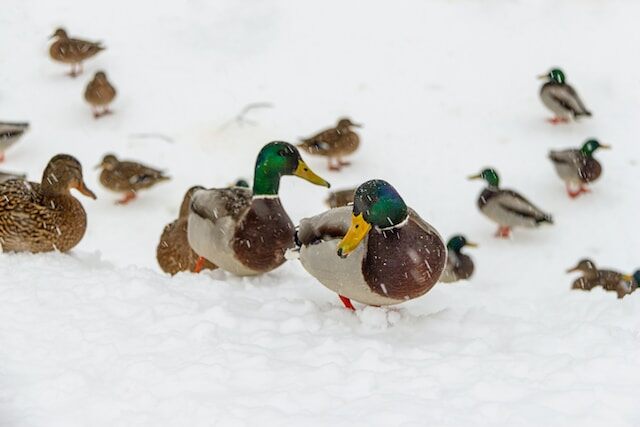
Conclusion
So, do ducks get cold? The answer is yes, they do feel the cold just like any other animal. However, ducks have evolved unique adaptations that help them survive in even the coldest of conditions.
Recap on the question “Do ducks get cold?”
In this article, we have explored how ducks are able to withstand cold temperatures through their insulating feathers and down, body fat, and ability to regulate their body temperature.
We also looked at their behavioral adaptations, such as huddling together for warmth and seeking shelter in protected areas.
We also discussed factors that affect a duck’s ability to survive in the winter such as age, health, and overall condition as well as the availability of food and water during the colder months.
Final thoughts on how humans can help protect wintering duck populations
As humans, we can play a crucial role in protecting wintering duck populations by ensuring open water sources are available for them to access.
This includes providing heated bird baths or even breaking up ice formations on ponds, so they can drink and bathe comfortably.
We can also support conservation organizations that work towards preserving wetland habitats where ducks naturally thrive. These efforts not only benefit ducks but all wildlife that rely on these ecosystems.
While it might be easy to overlook these feathered creatures during winter months when they seem inactive or disappear altogether from our sightlines – remember there is much more happening beneath the surface.
By learning about duck’s unique behavioral adaptations and how we can support their survival during colder weather conditions – we gain a greater understanding of nature at its most resilient and beautiful!
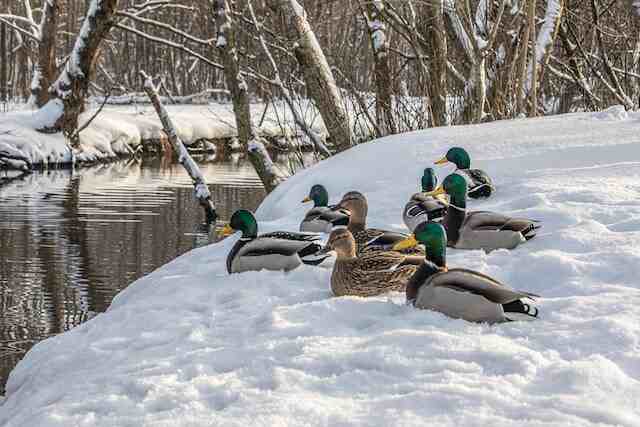
FAQs: Do Ducks Get Cold?
Do ducks get cold in the winter?
Yes, ducks can get cold in the winter, especially if they don’t have adequate shelter or water that’s not frozen.
How do ducks keep warm in the winter?
Ducks have several adaptations to keep warm in the winter, including down feathers, a thick layer of fat, and a waterproof coating on their feathers.
Can ducks survive in the cold?
Yes, ducks can survive in the cold as long as they have access to shelter, food, and water that’s not frozen.
What temperature is too cold for ducks?
Ducks can handle cold temperatures as long as they have adequate shelter and water that’s not frozen. However, temperatures below 20 °F (-6 °C) can be dangerous without proper protection.
Do ducks need heat lamps in the winter?
It’s not necessary to provide heat lamps for ducks in the winter, as long as they have adequate shelter and access to water that’s not frozen.
Can ducks get frostbite?
Yes, ducks can get frostbite on their feet, combs, and wattles in extremely cold temperatures or if they’re exposed to damp conditions.
What should I do if my ducks get too cold?
Provide your ducks with a warm, dry shelter and access to water that’s not frozen. You can also provide them with high-calorie foods to help them generate body heat.
Do ducks huddle together to keep warm?
Yes, ducks will often huddle together to share body heat and keep warm in cold temperatures.
Can ducks swim in cold water?
Yes, ducks can swim in cold water as long as it’s not frozen, and they have adequate insulation to keep warm.
Do different breeds of ducks have different cold tolerances?
Yes, some breeds of ducks, such as Muscovy ducks, are more cold-hardy than others and can tolerate colder temperatures.

